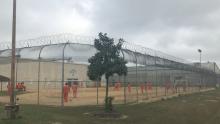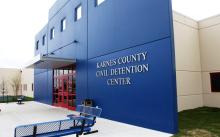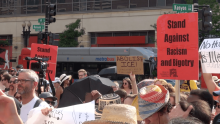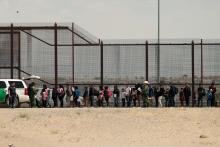ICE

During the first week of June, aggressive Immigration and Customs Enforcement raids in and around Los Angeles sparked protests. To quell these protests, President Donald Trump deployed the National Guard and the Marines to the city. The federal escalation seems intentionally frightening; editor at large and founder of The 19th Errin Haines described the situation as a “public and excessive show of force …[as] a means of reinforcing control.” As the situation continues, we can anticipate further conflicts over control of the military and other shocking acts like the aggressive removal and detainment of Sen. Alex Padilla (D-Calif.), who was removed from Homeland Security Secretary Kristi Noem’s press conference on June 12 while peacefully attempting to ask questions.
I live in LA, and I think what is happening in our city is also happening across the country.

Sara arrived in the United States as a 7-year-old refugee when her family fled religious persecution in Bangladesh. Eleven years later, Sara now calls Montgomery County, Md., home. But if the Trump administration has its way, she would be immediately deported because of her undocumented status.

On March 8, the Trump administration escalated its attack on free speech and protests by detaining a lawful resident for his role in Columbia University’s campus protests for Palestinian rights, saying that it was the “first arrest of many to come.” Sojourners spoke to seminaries, divinity schools, and Christian colleges and universities to try and understand how schools are defending international students amid the crackdown.

More than two dozen Christian and Jewish groups are suing the Department of Homeland Security over President Donald Trump’s decision to allow law enforcement raids and arrests in churches and other sensitive locations.

Now that President Donald Trump has rescinded longstanding policy limiting U.S. immigration enforcement in churches and other sensitive locations, some church leaders are wondering what they should do if an Immigration and Customs Enforcement officer comes knocking.

Within hours of coming into office, President Donald Trump rescinded a 14-year policy prohibiting Immigration and Customs Enforcement officers from arresting migrants near “sensitive locations,” including schools, hospitals, and places of worship. Here’s how church leaders responded

As we enter a second Donald Trump presidency, the stakes could not be higher for undocumented people and asylum seekers in this country. Having promised mass deportations to a degree never attempted in the United States, President-elect Trump’s new border czar, Tom Homan, has signaled that the administration’s cruelty will begin in my backyard — Chicago. What he might not be counting on is organized resistance from labor, faith, and immigration leaders that will attempt to thwart these plans.

After news broke Wednesday that President-elect Donald Trump planned to nix a policy discouraging immigration arrests in places like churches and schools, Indiana pastor Zach Szmara fielded questions from churches across the country about how to prepare.

IN SEPTEMBER 2020, reports emerged from the Irwin County Detention Center, an immigration facility in Georgia, detailing forced hysterectomies performed on migrant women held in custody. An Immigration and Customs Enforcement detention center in Ocilla, Ga., owned and managed by LaSalle Corrections, a private prison company, oversaw these surgeries in what have been described as appalling conditions and an “utter lack of care of detainees’ health” during the current COVID-19 pandemic.
Tragically, as too many people fail to realize, forced sterilizations are not a recent development. Rather, as a form of state violence they date back more than 100 years, when states across the country (beginning in 1907 with Indiana and followed in 1909 by Washington, California, and Connecticut, as well as many others over time) approved “eugenic sterilization.” These early laws passed by state legislatures allowed state officials to sterilize males and females—some as young as 12 or 13 years old—believed to have inheritable and incurable diseases or afflictions, including insanity, mania, or dementia.

Forced sterilization of women is a form of abuse and an act of violence against the very image of God in these women in immigration detention. While these accounts are shocking and horrifying, they are unfortunately part of the larger pattern of abuse and neglect present in detention centers that immigrant people and immigration advocates have been denouncing for years.

Earlier this month, a California judge ordered the release of more than 100 migrant children from Immigration and Customs Enforcement custody, but after ICE failed to meet specific prerequisites to release the children, the judge declared her order was “unenforceable,” leaving children in detention.

Against the backdrop of the Trump administration’s recent moves to restrict foreign work visas and suspend migration along the Mexican and Canadian borders, many are calling ICE’s order “xenophobic” and another example of the administration’s attempt to exclude non-U.S. citizens.

The guidance does not affect international students taking in-person classes. It also does not affect F-1 students taking a partial online course-load as long as some of their classes are conducted in-person. M-1 vocational program students and F-1 English language training program students will not be allowed to take any classes online.

Subcommittee Chairwoman Rep. Lucille Roybal-Allard (D-Calif.) said that there is a “dangerous subculture at the agency that cannot be tolerated and must be addressed.” She was referring to offensive comments in a CBP private Facebook group, allegations of detained children being kicked to wake them up by CBP agents, and reports of abuse and sexual assault of detained migrants by CBP officers.

Yazmin Juárez, a Guatemalan asylum seeker, told a House Oversight and Reform subcommittee that her 19-month-old daughter died because of medical negligence at a federal detention center in Texas.

“ICE is coming into our communities and tearing apart families and tearing apart our community on a regular basis, and they did so just again last week,” Sanctuary DMV organizer Ben Beachy said. “We need our D.C. elected officials to make D.C. a real sanctuary city, which means severing all ties with ICE.”

A Border Patrol official told a state lawmaker that the agency doesn't accept donations for facilities where children are reportedly being held in substandard conditions.

Dr. Scott Warren is defending himself against three felony charges including conspiracy to transport and harbor migrants — charges that could add up to 20 years in prison.

“In a representative democracy, if our legislators are not legislating in accordance with the moral law that we’re given by God, then it’s really on us to select representatives who will legislate in accordance with that law,” she said.

In June 2018, the Trump administration issued a “zero tolerance” policy in an effort to deter migrants, a majority from Central America, from entering the U.S. The policy resulted in the separation of nearly 2,800 immigrant children from their families at the U.S.-Mexico border in a little over a month.